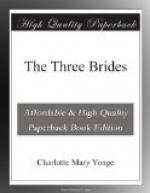“Then you hope she will wait for that?”
“I feel sure of it—that is, if she is not annoyed by this abominable usage from my family. Oh! Rosamond, you will help us when you get into your own house, and you will get Julius to see it in a proper light. Mother trusts to him almost as much as to Raymond; but it is our misfortune to be so much younger that she can’t believe us grown up.”
“O, Frank,” said Charlie, coming in, “here’s Price come up about the puppies.—What, Rosamond, has he got hold of you? What a blessing for me! but I pity you.”
Frank and Charlie went off together; and Julius was in the act of begging Cecil to illuminate a notice of the services, to be framed and put into the church porch, when Raymond came in from the other room to make up a whist-table for his mother. Rosamond gladly responded; but there was a slight accent of contempt in Cecil’s voice, as she replied, “I never played a game at cards in my life.”
“They are a great resource to my mother,” said Raymond. “Anne, you are too tired to play?—No, Julius, the pack is not there; look in the drawer of the chiffonier.”
Julius handed the list he had been jotting down to Cecil, and followed his brother, with his hands full of cards, unconscious of the expression of dismay, almost horror, with which Anne was gazing after him.
“Oh! let us be resolute!” she cried, as soon as the door was shut. “Do not let us touch the evil thing!”
“Cards?” said Cecil. “If Mrs. Poynsett cannot be amused without them, I suppose we shall have to learn. I always heard she was such an intellectual woman.”
“But we ought to resist sin, however painful it may be,” said Anne, gathering strength; “nay, even if a minister sets the example of defection.”
“You think it wicked,” said Cecil. “Oh no, it is stupid and silly, and an absurd waste of time, but no more.”
“Yes, it is,” said Anne. “Cards are the bane of thousands.”
“Oh yes, gambling and all that; but to play in the evening to amuse an invalid can have no harm in it.”
“An invalid and aged woman ought to have her mind set upon better things,” said Anne. “I shall not withdraw my testimony, and I hope you will not.”
“I don’t know,” said Cecil. “You see I am expected to attend to Mrs. Poynsett; and I have seen whist at Dunstone when any dull old person came there. What a troublesome crooked hand Julius writes— just like Greek! What’s all this? So many services—four on Sunday, two every day, three on Wednesdays and Fridays! We never had anything like this at Dunstone.”
“It is very superstitious,” said Anne.
“Very superfluous, I should say,” amended Cecil. “I am sure my father would consent to nothing of the kind. I shall speak to Raymond about it.”
“Yes,” said Anne; “it does seem terrible that a minister should try to make up for worldly amusements by a quantity of vain ceremonies.”




